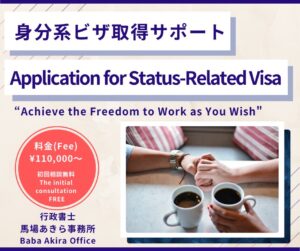"What Happens to the Residency Status of Spouses of Japanese Nationals? A Guide to Post-Divorce Procedures" Part 3
Understanding Post-Divorce Residency Status Changes
Topic: Procedures and Options for Remaining in Japan After Divorce
For foreigners residing in Japan under the "Spouse or Child of Japanese National" residency status, divorce typically necessitates a change in residency status. While maintaining the same status is not possible, other residency options may allow continued stay in Japan if specific conditions are met. This article provides an overview of the basic knowledge and options for changing your residency status after divorce.
1. Why a Residency Status Change Is Necessary After Divorce
The "Spouse or Child of Japanese National" residency status is granted based on the marital relationship. Once the relationship ends, the basis for the status is lost.
(1) Risk of Losing Residency Status
- You may stay in Japan until your current visa expires.
- However, renewing the visa is generally not permitted, and applying for a new residency status is required.
(2) Reporting Obligation Under Immigration Law
After divorce, you are legally required to report the change to the Immigration Services Agency within 14 days. Failure to report may negatively impact future applications for residency status changes.
2. Options for Changing Residency Status After Divorce
(1) Long-Term Resident Visa
- Overview: This visa is granted to individuals with significant ties to Japan and a stable life foundation.
- Requirements:
- A long period of residence in Japan.
- Demonstrated stability in terms of housing and income.
- If you have a child with Japanese nationality, being their custodial parent may strengthen your application.
- Advantages: Broad activity permissions, including employment.
(2) Work Visa
- Overview: This visa is issued for employment in Japan, tailored to specific professions or industries.
- Requirements:
- Proof of employment in Japan.
- Relevant qualifications or skills for the job (e.g., education or professional experience).
- Main Types: Engineer/Specialist in Humanities/International Services Visa, Skilled Labor Visa, etc.
(3) Other Residency Statuses
- Family Stay: Applicable if you have family members with a valid residency status in Japan.
- Student Visa: An option if you wish to pursue further education in Japan.
3. Basic Procedures for Changing Residency Status
(1) Required Documents
The following documents are generally needed to apply for a change in residency status:
- Application form for a change of residency status (available at the Immigration Bureau).
- Passport and residence card.
- Documents proving the divorce (e.g., divorce acceptance certificate).
- Documents specific to the new residency status (e.g., employment certificate, proof of income).
- Evidence of a stable life foundation (e.g., housing contract, bank statements).
(2) Procedure Steps
- Submit Application to the Immigration Bureau
Visit your nearest Immigration Bureau to submit the necessary documents. - Wait for Processing
Processing can take several weeks to a few months. - Receive the Decision
If approved, a new residence card will be issued. If denied, you may need to prepare for departure.
4. Tips for a Successful Residency Status Change
(1) Demonstrate Stability in Japan
- Provide documentation of employment contracts, income, and housing to show you have a stable life foundation.
(2) Clearly Explain Reasons for Staying in Japan
- Explain your ties to Japan, such as raising a child with Japanese nationality, a long history of living in Japan, or your Japanese language ability.
(3) Seek Professional Advice
- Consult with administrative scriveners (gyoseishoshi) or lawyers for assistance in preparing documents and navigating the application process.
5. What to Do If Your Application Is Denied
If your application for a residency status change is denied, you may need to prepare for departure. However, you can also consider the following options:
- Reapply (after addressing the reasons for denial and submitting additional documents).
- Consult with the Immigration Bureau if you have special circumstances.
Conclusion
Changing your residency status after divorce is a crucial step to continuing your life in Japan. Understanding your options and preparing the necessary documentation in advance is key to a successful application. In the next article, we will provide a detailed explanation of "The Specific Procedures for Residency Status Changes."
